Related Research Articles
In object-oriented programming, a class defines the shared aspects of objects created from the class. The capabilities of a class differ between programming languages, but generally the shared aspects consist of state (variables) and behavior (methods) that are each either associated with a particular object or with all objects of that class.
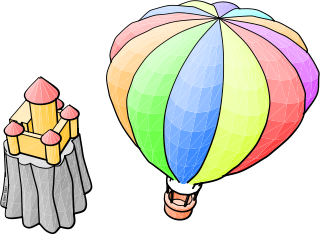
Smalltalk is a purely object oriented programming language (OOP) that was originally created in the 1970s for educational use, specifically for constructionist learning, but later found use in business. It was created at Xerox PARC by Learning Research Group (LRG) scientists, including Alan Kay, Dan Ingalls, Adele Goldberg, Ted Kaehler, Diana Merry, and Scott Wallace.
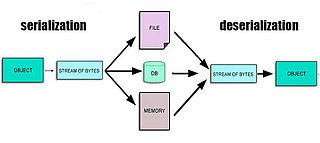
In computing, serialization is the process of translating a data structure or object state into a format that can be stored or transmitted and reconstructed later. When the resulting series of bits is reread according to the serialization format, it can be used to create a semantically identical clone of the original object. For many complex objects, such as those that make extensive use of references, this process is not straightforward. Serialization of objects does not include any of their associated methods with which they were previously linked.
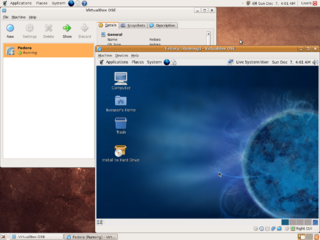
In computing, a virtual machine (VM) is the virtualization or emulation of a computer system. Virtual machines are based on computer architectures and provide the functionality of a physical computer. Their implementations may involve specialized hardware, software, or a combination of the two. Virtual machines differ and are organized by their function, shown here:

Liberty BASIC (LB) is a commercial computer programming language and integrated development environment (IDE). It has an interpreter, developed in Smalltalk, which recognizes its own dialect of the BASIC programming language. It runs on 16- and 32-bit Windows and OS/2.
DLL hell is an umbrella term for the complications that arise when one works with dynamic-link libraries (DLLs) used with older Microsoft Windows operating systems, particularly legacy 16-bit editions, which all run in a single memory space. DLL hell can appear in many different ways, wherein affected programs may fail to run correctly, if at all. It is the Windows ecosystem-specific form of the general concept dependency hell.

In computer science, an interpreter is a computer program that directly executes instructions written in a programming or scripting language, without requiring them previously to have been compiled into a machine language program. An interpreter generally uses one of the following strategies for program execution:
- Parse the source code and perform its behavior directly;
- Translate source code into some efficient intermediate representation or object code and immediately execute that;
- Explicitly execute stored precompiled bytecode made by a compiler and matched with the interpreter's virtual machine.
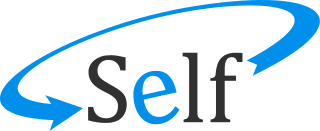
Self is a general-purpose, high-level, object-oriented programming language based on the concept of prototypes. Self began as a dialect of Smalltalk, being dynamically typed and using just-in-time compilation (JIT) with the prototype-based approach to objects: it was first used as an experimental test system for language design in the 1980s and 1990s. In 2006, Self was still being developed as part of the Klein project, which was a Self virtual machine written fully in Self. The latest version, 2024.1 was released in August 2024.
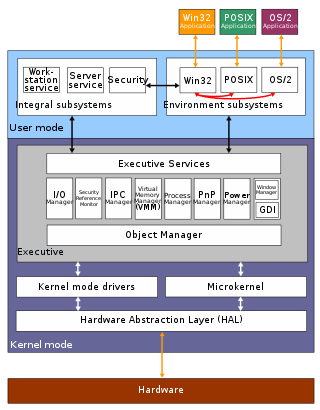
The Windows API, informally WinAPI, is the foundational application programming interface (API) that allows a computer program to access the features of the Microsoft Windows operating system in which the program is running. Programs access API functionality via dynamic-link library (DLL) technology.
VisualWorks is a cross-platform implementation of the Smalltalk language. It is implemented as a development system based on images, which are dynamic collections of software objects, each contained in a system image.
C++/CLI is a variant of the C++ programming language, modified for Common Language Infrastructure. It has been part of Visual Studio 2005 and later, and provides interoperability with other .NET languages such as C#. Microsoft created C++/CLI to supersede Managed Extensions for C++. In December 2005, Ecma International published C++/CLI specifications as the ECMA-372 standard.

A class browser is a feature of an integrated development environment (IDE) that allows the programmer to browse, navigate, or visualize the structure of object-oriented programming code.
A dynamic-link library (DLL) is a shared library in the Microsoft Windows or OS/2 operating system.
In computer programming, DLL injection is a technique used for running code within the address space of another process by forcing it to load a dynamic-link library. DLL injection is often used by external programs to influence the behavior of another program in a way its authors did not anticipate or intend. For example, the injected code could hook system function calls, or read the contents of password textboxes, which cannot be done the usual way. A program used to inject arbitrary code into arbitrary processes is called a DLL injector.
Component Object Model (COM) is a binary-interface technology for software components from Microsoft that enables using objects in a language-neutral way between different programming languages, programming contexts, processes and machines.

Open Cobalt is a free and open-source software platform for constructing, accessing, and sharing virtual worlds both on local area networks or across the Internet, with no need for centralized servers.

Object-oriented programming (OOP) is a programming paradigm based on the concept of objects, which can contain data and code: data in the form of fields, and code in the form of procedures. In OOP, computer programs are designed by making them out of objects that interact with one another.
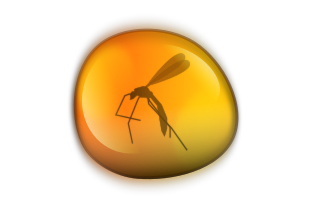
Amber Smalltalk, formerly named Jtalk, is an implementation of the programming language Smalltalk-80, that runs on the JavaScript runtime of a web browser. It is designed to enable client-side development using Smalltalk. The programming environment in Amber is named Helios.
Objective-C is a high-level general-purpose, object-oriented programming language that adds Smalltalk-style message passing (messaging) to the C programming language. Originally developed by Brad Cox and Tom Love in the early 1980s, it was selected by NeXT for its NeXTSTEP operating system. Due to Apple macOS’s direct lineage from NeXTSTEP, Objective-C was the standard language used, supported, and promoted by Apple for developing macOS and iOS applications from 1997, when Apple purchased NeXT until the introduction of the Swift language in 2014.
ASP.NET Web Forms is a web application framework and one of several programming models supported by the Microsoft ASP.NET technology. Web Forms applications can be written in any programming language which supports the Common Language Runtime, such as C# or Visual Basic. The main building blocks of Web Forms pages are server controls, which are reusable components responsible for rendering HTML markup and responding to events. A technique called view state is used to persist the state of server controls between normally stateless HTTP requests.
References
- ↑ "_strrev, _wcsrev, _mbsrev, _mbsrev_l". 2 December 2022.